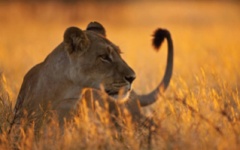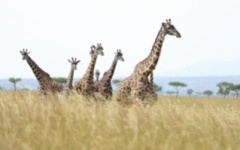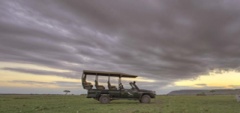Africa Safari
Africa Safari
An Africa safari is one of the continent's highlights!
An Africa safari , with its unique wildlife, its excellent service and stunning destinations remains one of the world’s most sought-after holiday experiences. With so many countries to choose from and variations on offer in each, it can, however, be a little daunting as to where to start planning. In this page, we have tried to answer some of the main questions we are asked by clients looking to plan their perfect safari holiday. Using over 20 years of holiday planning experience, we regularly visit the countries we recommend, staying in the properties and viewing the different wildlife areas to make sure we can tailor-make the best Africa safari holiday possible.
When to go on an Africa safari?
Certainly one of the first decisions when looking at a safari trip to Africa is when to go. Broadly speaking, if you are travelling during the northern hemisphere summer period, between June and November, you can take your pick out of any of the countries East and Southern Africa. The “name of the game” in safari comes down to water. If you choose to holiday when the parks are drier you will find that the non-predatory animals (such as the wildebeest, zebras, giraffe etc) have to convene around the main water sources and so become that much easier to see and, in turn, attract the infamous predators such as lion and leopard. This is not to say that a safari outside of this window isn’t possible but the weather variations between destinations start to get a bit more complex. (which is where we can step in and help you to make sure you get the most out of your safari trip) Please follow this link for more information on the best time to visit Africa for a safari.
What is the “Big 5” and why is it important?
The term “The Big 5” refers to some of Africa’s more famous residents, namely the rhino, the elephant, the leopard, the lion and the Cape Buffalo. This collection of animals were, historically, known as the hardest animals in Africa to hunt (back in the 1970s when an Africa safari was the reserve of the super wealthy). These days, with the prehistoric appearance of a rhino, the mighty majesty of the elephant, the sleek prowl of the leopard, the regal countenance of the lion and the outright bad-temperedness of the buffalo, these are still some of the favourite animals to try and see.
What other animals will I see on my Africa safari?
Often the animal sightings that are the most rewarding are when you are trying to find one of the “big 5” and you encounter another animal altogether and get to understand how they interact with this awesome environment. To name a few of the principle animals on any safari holiday, on pretty much all safaris to East or Southern Africa you will see giraffes, zebra, elephant, lion, leopard (if they let you!), wildebeest, gazelles to name but a few. There are then more specific areas that offer different animals, such as hippos and crocodiles around the larger rivers (eg. Nyerere National Park or South Luangwa), the great wildebeest herds of the East African grasslands (in the Serengeti and the Masai Mara) or the vast elephant herds of Tarangire National Park and the Chobe waterfront. If there is an animal you are particularly wanting to include in your safari then just let one of us know and we can certainly make sure that you visit one of the safari parks where you will be given the best chance to see them. Contact us
Do you want to include some beach time?
This is often a question that dictates the rest of the holiday. The reason being that, even though the continent of Africa is surrounded by oceans, it is only really the coastlines of Kenya, Tanzania, Mozambique and the very northern part of South Africa that are suitable for a “white sand/azure water” type of holiday. It is true that it is possible to fly through either Nairobi, Kenya, or Johannesburg, South Africa, to the luxury islands of the Seychelles and Mauritius but, with the added cost and logistics, most will steer towards the above. This is discussed further in the pricing section below, but, roughly speaking, due to the ease of getting from the safari areas to the coast in Kenya and Tanzania, many who are looking to keep the cost of their Africa safari lower will consider those countries over the southern African countries of Botswana, Zambia, Zimbabwe and Namibia where the options become more expensive. Please follow this link for some suggested Africa safari itineraries.
How long should I expect an Africa safari holiday to last?
Whilst there is no specific time you should spend on safari, the average amount of time for most safari trips is between 3 and 6 nights, depending on how many destinations you are combining. If you are then looking to add on some time on the beach afterwards then anything between 10 and 15 nights is a reasonable timeframe. Again, a good starting point would be to either arrange a chat with one of us to talk through the options or to take a look at our itinerary section where a range of suggested itineraries are featured.
How much will an Africa safari cost?
This is the final and probably most relevant question in this section. Because an Africa safari is dependent on so many factors (time of year, destination, camp, size of your party etc.), there is, annoyingly, no set price of a safari to Africa. Basic tented camps will start from around USD $700 per person per night which will include all of the park fees, game viewing activities, accommodation and food. These tented camps will more often than not have running water, ensuite bathrooms, flushing toilets and comfortable beds and so are, by no means, ‘basic’. If you are looking for something more luxurious, with amenities such as swimming pools, free standing bathtubs, private verandas, private plunge pools and stunning interior designs, then of course, the price goes up quite rapidly – expect to pay around the $800-$1,400 per person per night mark for these types of properties.
Again, our advice is, if you are just starting to plan your ideal Africa safari, just give us a call or send us an email and we will be more than happy to help you with your plans!







